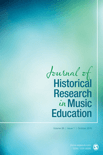
Journal of Historical Research in Music Education
Scope & Guideline
Cultivating Knowledge at the Intersection of Music and History
Introduction
Aims and Scopes
- Historical Analysis of Music Education:
The journal showcases research that delves into the history of music education, tracing its development from various cultural and geographical perspectives. - Impact of Social Contexts on Music Learning:
It examines how social, political, and cultural contexts have shaped music education practices, highlighting the interplay between music and societal issues. - Biographical Studies of Influential Educators:
The journal features biographical studies of significant figures in music education, revealing their contributions and legacies in shaping contemporary practices. - Music Education Curriculum Development:
Research on curriculum innovations and historical changes in music education, including pedagogical approaches and their effectiveness across different educational settings. - Multicultural Perspectives in Music Education:
The journal includes work that explores multicultural and global perspectives in music education, emphasizing the importance of diversity in teaching and learning. - Pedagogical Methods and Practices:
It addresses various pedagogical methods utilized in music education throughout history, contributing to a broader understanding of effective teaching strategies.
Trending and Emerging
- Jazz Education and Public Pedagogy:
Recent publications focusing on jazz education highlight the genre's significance in music education, emphasizing its cultural impact and pedagogical relevance. - Social Justice and Music Education:
There is a growing trend towards exploring themes of social justice within music education, addressing issues of equity, representation, and advocacy in teaching practices. - Diverse Cultural Contributions to Music Education:
Emerging research increasingly acknowledges and incorporates diverse cultural contributions, expanding the understanding of music education beyond Western frameworks. - Oral Histories and Personal Narratives:
The use of oral histories and personal narratives is gaining traction, providing rich, qualitative insights into the experiences of music educators and their impact on the field. - Collaborative and Community-Based Music Practices:
There is a rising interest in collaborative and community-based music education practices, reflecting a shift towards inclusivity and collective learning experiences.
Declining or Waning
- Traditional Western Music Education:
There appears to be a waning interest in research centered solely on traditional Western music education practices, as the journal increasingly embraces broader, more inclusive themes. - Historical Accounts of Solo Artists:
Research focusing narrowly on the contributions of solo artists in music education has declined, suggesting a move towards ensemble-based or community-oriented studies. - Music Education in Formal Settings:
Studies exclusively examining music education within formal school settings are less frequent, indicating a trend towards exploring informal and community-based music education. - Historical Critiques of Music Education Policies:
There has been a decrease in publications critiquing historical music education policies, possibly reflecting a shift towards more constructive and forward-looking research.
Similar Journals
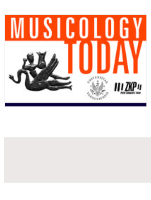
Musicology Today
Connecting Scholars and Trends in Music ResearchMusicology Today, published by SCIENDO, is a pivotal journal in the field of musicology, presenting a platform for scholars, researchers, and practitioners to disseminate their findings and engage with current trends in music research. With its ISSN 1734-1663 and E-ISSN 2353-5733, the journal aims to provide a comprehensive overview of various aspects of music, including theory, history, and ethnomusicology, fostering a multidisciplinary dialogue among its contributors. Located in Warsaw, Mazovia, Poland, this journal is not only committed to high academic standards but also to promoting open access to knowledge, thereby enhancing accessibility for a global audience. As it continues to bolster its reputation in the academic community, Musicology Today plays an essential role in shaping the future of music scholarship and invites the engagement of seasoned researchers and emerging voices alike.
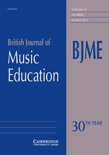
British Journal of Music Education
Fostering Insightful Dialogues in Music PedagogyBritish Journal of Music Education is a prestigious academic publication dedicated to advancing the field of music education. Published by Cambridge University Press, it benefits from a notable impact factor that positions it in the Q2 category in Education and the Q1 category in Music as of 2023. This journal serves as a vital platform for researchers, educators, and students alike, focusing on innovative research, pedagogical studies, and theoretical discussions that shape the practice of music education globally. Since its inception in 1984, the journal has contributed significantly to the understanding of music pedagogy and continues to be relevant and influential, currently spanning the years from 1984 to 1998 and 2007 to 2024. With impressive rankings, including rank #16/180 in Arts and Humanities (Music) and rank #669/1543 in Social Sciences (Education) on Scopus, it highlights the journal's commitment to scholarly excellence. Though it does not currently offer open access, its contributions are an essential resource for anyone involved in the education landscape of music.
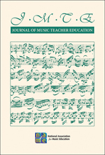
Journal of Music Teacher Education
Innovating Practices for Tomorrow's Music Educators.The Journal of Music Teacher Education, published by SAGE Publications Inc, is a leading scholarly outlet dedicated to advancing the field of music education. With an ISSN of 1057-0837 and an E-ISSN of 1945-0079, this journal explores a wide array of topics pertinent to music teaching and learning, serving as a vital resource for both researchers and practitioners in the music education community. Since its inception in 1991, it has consistently been positioned among the top-tier journals in both music and education, achieving a notable Q1 ranking in music and Q2 in education as of 2023. With impressive Scopus rankings, placing it in the 89th percentile for music and 47th percentile for education, the journal plays a crucial role in facilitating dialogue and disseminating innovative research aimed at improving music pedagogy. While not an open-access publication, it provides access to invaluable insights and practices that inform both theory and application in music education, making it an essential read for educators, students, and researchers alike, as they navigate the evolving landscape of music teaching. Explore the latest findings and thought-provoking discussions that shape the future of music education in the United States and beyond.

Research Studies in Music Education
Empowering Educators Through Groundbreaking ResearchResearch Studies in Music Education is a prestigious peer-reviewed journal published by SAGE Publications Ltd, dedicated to advancing the field of music education through innovative research and critical discourse. With an ISSN of 1321-103X and an E-ISSN of 1834-5530, this journal has been a vital resource for academics since its inception in 1993, and continues to serve as a platform for high-quality scholarship aimed at fostering excellence in music education practices worldwide. The journal's impressive Q1 ranking in Music and Q2 in Education for 2023, along with a Scopus rank of #11 out of 180 in the Arts and Humanities category, underscores its significance and influential presence within the academic community. Although it operates under traditional publishing models, readers can expect to encounter a wealth of knowledge that reflects current trends, methodologies, and insights in the realms of music teaching and learning. The journal not only aims to enrich the discourse in music education but also supports researchers, educators, and students in their endeavors to improve musical understanding and pedagogy.

BULLETIN OF THE COUNCIL FOR RESEARCH IN MUSIC EDUCATION
Transforming Research into Educational ExcellenceBULLETIN OF THE COUNCIL FOR RESEARCH IN MUSIC EDUCATION, published by UNIV ILLINOIS PRESS, is a premier scholarly journal dedicated to advancing the field of music education through rigorous research and critical discourse. With an ISSN of 0010-9894 and E-ISSN 2162-7223, this journal plays a significant role in disseminating innovative findings and educational practices, ranking in Q1 for Music and Q2 for Education as of 2023. The journal's esteemed position is further highlighted by its Scopus ranking, placing it in the 80th percentile among music-related publications. Covering a time span from 2002 to 2024, it serves as a vital resource for educators, researchers, and graduate students alike. Although the journal does not currently offer open access, its contributions remain crucial in shaping music education research and practice. The BULLETIN not only inspires scholarly inquiry but also enhances the discourse surrounding effective music education methodologies.
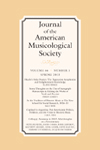
JOURNAL OF THE AMERICAN MUSICOLOGICAL SOCIETY
Nurturing the future of musicological inquiry.JOURNAL OF THE AMERICAN MUSICOLOGICAL SOCIETY, published by University of California Press, is a prestigious peer-reviewed journal dedicated to advancing the field of musicology. With an ISSN of 0003-0139 and E-ISSN 1547-3848, this journal has been a cornerstone of scholarly communication since its inception in 1970 and continues to be relevant through 2024. Its esteemed standing is reflected in its Q2 ranking in the Music category and a respectable 71/180 ranking in the Arts and Humanities discipline, placing it in the 60th percentile among its peers. The journal provides an essential platform for researchers, professionals, and students to explore diverse topics in musicology, ranging from historical studies to contemporary analyses. While it does not currently offer Open Access options, its rigorous editorial standards ensure the publication of high-quality research that contributes significantly to the academic dialogue in music studies. With its address based in the United States at 155 Grand Ave, Suite 400, Oakland, CA 94612-3758, the journal remains a vital resource for those seeking to deepen their understanding of the complexities of music and its societal impacts.

Resonancias
Exploring the Harmonies of Knowledge.Resonancias is a distinguished open-access journal published by the Pontificia Universidad Católica de Chile, dedicated to advancing the field of music studies. With an ISSN of 0717-3474 and an E-ISSN of 0719-5702, this journal has been promoting scholarly discourse in music since its transition to open access in 2014. Resonancias serves as a critical platform for researchers, professionals, and students alike, enabling them to disseminate knowledge and explore innovative perspectives in musicology. With its current Q2 ranking in the field of music as of 2023, and a Scopus ranking of #108 out of 180, this journal exemplifies its commitment to quality and impact within the academic community, fostering an accessible database of music research from Chile and beyond. Situated at AVENIDA VICUNA MACKENNA 4860, MACUL, SANTIAGO, CHILE, Resonancias not only promotes original research but also includes critical reviews, interviews, and essays that contribute to the rich tapestry of musical knowledge.
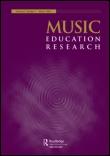
Music Education Research
Fostering Excellence in Music PedagogyMusic Education Research is a prestigious journal dedicated to advancing scholarship in the field of music education, published by Routledge Journals, Taylor & Francis Ltd. With a significant impact factor reflected in its Q1 ranking in Music and Q2 in Education for 2023, this journal is a critical resource for researchers, educators, and practitioners alike. It consistently ranks high in both the Arts and Humanities and Social Sciences categories, with an impressive position of Rank #8 in Music out of 180 journals, indicating its influence in shaping contemporary discourse. Aimed at fostering innovation and critical examination within music education, Music Education Research invites submissions that explore a broad spectrum of topics, encompassing pedagogical practices, policy implications, and curriculum development. Operating from the United Kingdom, the journal provides a vital platform for sharing cutting-edge research and is committed to improving music learning experiences across various educational contexts.
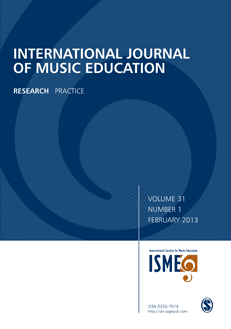
International Journal of Music Education
Unveiling new pathways in music teaching and learning.The International Journal of Music Education is a premier academic platform published by SAGE Publications Ltd, dedicated to exploring the interdisciplinary intersections of music and education. With its ISSN 0255-7614 and E-ISSN 1744-795X, this esteemed journal has been contributing significantly to the field since 1996 and will continue to do so through 2024, underscoring its commitment to advancing scholarly discourse in music pedagogy. It boasts impressive ranking metrics, including Q1 status in Music and Q2 in Education as of 2023, reflecting its influence within these domains. Ranked #10 out of 180 in Music (94th percentile) and #501 out of 1543 in Education (67th percentile) by Scopus, the journal is acknowledged for its rigorous peer-reviewed articles that address contemporary issues, innovative teaching strategies, and the role of music in learning environments. Although it does not offer open access, researchers, professionals, and students are encouraged to engage with its comprehensive research findings, ensuring the advancement of both music education and the broader arts landscape.
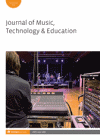
Journal of Music Technology & Education
Unleashing creativity at the intersection of music and tech.Welcome to the Journal of Music Technology & Education, a leading academic journal dedicated to the intersection of music, technology, and pedagogical practices. Published by INTELLECT LTD in the United Kingdom, this journal has gained considerable recognition within the scholarly community, particularly noted for its strong rankings across multiple disciplines. As of 2023, it holds a prestigious Q1 quartile position in Music, Q2 in Education, and Q3 in Computer Science Applications, highlighting its multifaceted impact on various fields. Spanning over a decade from 2012 to 2023, the journal features rigorous peer-reviewed articles that explore innovative approaches to music education, technology integration in teaching practices, and advancements in digital music creation. Researchers, educators, and students alike will find valuable insights and cutting-edge research to keep them at the forefront of this rapidly evolving landscape. Access to the journal's content is available to a broad audience, making it a vital resource for anyone interested in the vibrant world of music technology.